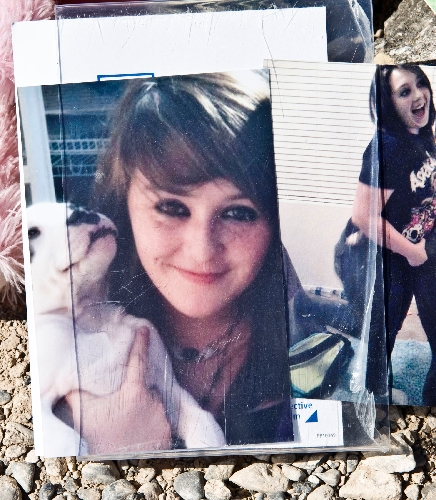Missing kids create dilemma in wake of Otremba case

Alyssa Otremba wasn’t the kind of girl to just disappear.
The 15-year-old kept in constant contact with her mom. The evening she vanished was no different.
Her text message said she would be home in half an hour, so when she didn’t show up from her walk, Alyssa’s family knew something was wrong.
A search party of family and friends found her body the next day in a desert lot near her northwest valley home.
The tragic end prompted some to question the response by Las Vegas police, who were called about four hours after Alyssa’s last text.
Kim White, whose son is a sophomore at Arbor View High School, said police need to begin their search for missing children right away.
“For a child, you look,” she said. “You don’t take a chance. Better safe than sorry.”
For the team of Las Vegas police detectives charged with finding more than 4,500 missing children among more than 7,000 cases a year, each report holds potential for the worst-case scenario. But they must balance resources with the facts from their investigations in their search for the missing.
“Hopefully we find them immediately,” missing persons Lt. Rob Lundquist said. “Sometimes we do, and sometimes we don’t.”
Every investigation begins with a call to report the child missing. And, Lundquist said, there is no minimum time that must pass before that report can be made. If someone believes a child or adult is missing, the report can be made immediately, he said.
From there, Las Vegas police rely on standard criteria involving a number of factors and potential dangers before deciding how to proceed.
A patrol officer responds to most calls, takes a report, and the missing child’s name is entered immediately in a national database. The patrol officer consults a detective by phone to determine whether the child is in potential danger.
They consider a number of factors, including the age of the child, any mental disability or medical condition, any suicidal thoughts or suspected foul play. They look at other things, such as whether the child has run away in the past or had a fight with parents just before the disappearance.
They also listen to parents, who “know their children best,” Lundquist said.
If a good kid with a history of keeping in touch with parents suddenly vanishes, detectives see a red flag, he said.
If police believe the child is endangered, a missing persons detective will go to the scene and continue the investigation, questioning relatives, identifying friends and checking possible hang-out locations such as parks.
They might create missing persons fliers to distribute to hospitals, the bus system and media. Depending on the circumstances, they might conduct a wider search of an area using patrol officers and volunteers, Lundquist said.
Investigators rely on parents to provide leads on where missing children like to hang out and who their friends are, so it’s important for parents to communicate and know all they can about their offspring, he said.
The night Alyssa disappeared, her mom called police just before 11 p.m., more than four hours after the last text.
Family friend Olivia Murphy has said a detective convinced Alyssa’s mother the girl was out partying when she vanished Sept. 2.
“Alyssa would never do that to her mother,” said Melissa Taubman, another family friend. “Alyssa would never just disappear and not call her.”
When the teen didn’t show up the next morning, family and friends organized a search party that scoured the area around her home near U.S. Highway 95 and Grand Teton Drive. After almost an entire day of searching, they found her burned body in a desert lot.
The man charged with Alyssa’s murder, Javier Righetti, 19, told detectives he randomly attacked Alyssa as she walked home, raped her, stabbed her 40 times with a kitchen knife and later set her body on fire.
Taubman said the family didn’t want to criticize detectives and acknowledged Alyssa was probably already dead when her mom called police.
“Can I tell you (a police search) would have prevented anything? No. But we would have definitely found her sooner,” Taubman said.
Sonia Lucero with Nevada Child Seekers, a nonprofit that helps families and police find missing children, said her organization offers free help to parents in their search. Services include printing missing persons fliers and using volunteers to put them up in neighborhoods.
In her experience, Lucero said, detectives are often hard to reach because they are in the field doing investigations and trying to find missing children, even habitual runaways.
“I understand the concerned reaction, but Metro does what they can,” she said. “They’re doing great stuff.”
Lundquist said missing persons detectives take it hard when one of their cases ends badly, second-guessing themselves and wondering what they might have done differently.
“The detectives, they wear their cases on their shoulder,” Lundquist said. “It weighs on them heavily.”
Review-Journal reporter Antonio Planas contributed to this report. Contact reporter Brian Haynes at
bhaynes@ reviewjournal.com or 702-383-0281.